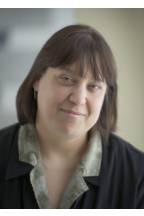Kostadinka Bizheva

Professor, Graduate Officer
Email: kbizheva@uwaterloo.ca
Location: PHY 247
Phone: 519-888-4567 x47517
Biography
Dr. Bizheva's research focuses on the development of novel optical imaging technology (Optical Coherence Tomography - OCT) that can be used in clinics to image various part of the human body for diagnostic purposes or for monitoring the outcome of drug therapy or surgery.
Imaging with the OCT technology is non-contact, non-invasive and some of its medical applications include the diagnosis of potentially blinding diseases such as glaucoma, diabetic retinopathy or macular degeneration, screening for skin or oral cancer, or monitoring of surgical procedures such as retinal, corneal, heart and brain surgery.
Compared to commercially available OCT systems, the OCT technology developed in Dr. Bizheva's lab provides ultrahigh resolution in biological tissue sufficient to observe its cellular structure and the smallest blood vessels. Dr. Bizheva's research group has extensive and successful collaborations with Canadian and international industrial partners, as well as clinical collaborators with multiple hospitals in the Greater Toronto Area.
Imaging with the OCT technology is non-contact, non-invasive and some of its medical applications include the diagnosis of potentially blinding diseases such as glaucoma, diabetic retinopathy or macular degeneration, screening for skin or oral cancer, or monitoring of surgical procedures such as retinal, corneal, heart and brain surgery.
Compared to commercially available OCT systems, the OCT technology developed in Dr. Bizheva's lab provides ultrahigh resolution in biological tissue sufficient to observe its cellular structure and the smallest blood vessels. Dr. Bizheva's research group has extensive and successful collaborations with Canadian and international industrial partners, as well as clinical collaborators with multiple hospitals in the Greater Toronto Area.
Research Interests
- Biomedical optics
- Optical coherence tomography
- Tissue optics
- Optical spectroscopy
- Confocal and fluorescence microscopy
- Ultrafast optics
- Clinical Imaging
- Neuroscience
- Optical Devices
- Technology and Optics
- Biochemistry and Biophysics
- Photonics
- Devices and Analytical Methods
- Disease Detection and Modeling
- Optical Systems
Scholarly Research
Dr. Bizheva's primary research contributions include: a) technological development of ultrahigh resolution OCT (UHROCT) to allow for imaging of sub-cellular details in living biological tissue; b) novel biomedical applications of UHROCT, for example in ophthalmology and neuroscience; c) computer modeling of light interaction with biological cells; and d) image processing algorithms for UHROCT. In the past 5 years Dr. Bizheva has built a laboratory with a number of state-of-the-art UHROCT systems, established collaborations with research groups at UW and other Canadian universities and clinics, as well as many companies, manufacturing OCT systems or related equipment.
Education
- 2001 PhD Physics/Biomedical Optics, Tufts University, Medford, MA, USA
- 1997 MSc Physics/Biomedical Optics, Tufts University, Medford, MA, USA
- 1993 BSc Solid State Physics and Electronics Engineering, Plovdiv University, Plovdiv, Bulgaria
Awards
- 2008-2010, University Faculty Award, NSERC
- 2005-2008, University Faculty Award, NSERC
Service
- Waterloo-Wellington Annual Science Fair, Regular Judge
Professional Associations
- 2008-present Canadian Association of Physicists (CAP), Chair
- 2005-2007 Optical Society of America Student Chapter, President of Southwestern Ontario
Affiliations and Volunteer Work
- Cross Appointment to Optometry and Vision Sciences
- Centre for Bioengineering and Biotechnology
Teaching*
- ECE 105 - Classical Mechanics
- Taught in 2020, 2021, 2022, 2024
- PHYS 396 - Biophysics of Imaging
- Taught in 2021, 2023
* Only courses taught in the past 5 years are displayed.
Selected/Recent Publications
- Puvanathasan, P., Bizheva, K. Interval type-II fuzzy anisotropic diffusion algorithm for speckle noise reduction in optical coherence tomography images. Optics Express (2), volume 17, pp. 733-746.
- Puvanathasan, P., Forbes, P., Ren, Z., Malchow, D., Boyd, S., Bizheva, K. High-speed, high-resolution Fourier-domain optical coherence tomography system for retinal imaging in the 1060 nm wavelength region. Optics Letters (21), volume 33, pp 2479-2481.
- Puvanathasan, P., Bizheva, K. Speckle noise reduction algorithm for optical coherence tomography based on interval type II fuzzy set. Optics Express (24), volume 15, pp. 15747-15758.
- Resch, K.J., Puvanathasan, P., Lundeen, J.S., Mitchell, M.W., Bizheva, K. Optics Express (14), volume 15, pp. 8797-8804.
- Bizheva, K., Pflug, R., Hermann, B., Povazay, B., Sattmann, H., Anger, E., Reitsamer, H., Popov, S., Taylor, J.R., Unterhuber, A., Ahnelt, P., Drexler, W. PNAS (13), volume 103, pp. 5066-5071.